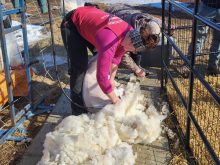An open border to ship youthful cattle and beef products to the United States should not affect the plans of new packing operations starting up this year in Canada.
“The border was a variable for everybody but the whole Rancher’s Beef concept did not depend on a closed border,” said Art Price, chief executive officer of the company.
Rancher’s Beef should be running by the fall offering value-added, specialty beef cuts to international markets in North America, Europe and Asia.
It will be built north of Calgary in the Municipal District of Rocky View. Protests from residents in northeastern Calgary dogged the company, so it approached the municipality last fall. Development permits are in place and an agreement was reached with the municipality and province for water and sewage facilities.
Read Also

Charges laid after cattle theft
Saskatchewan RCMP lay two charges against a man after six cattle went missing.
The company has raised its target equity of $32 million among 50 producer partners.
A co-operative formed in southwestern Alberta does not expect the border opening to have much impact because it plans to process animals older than 30 months. These mature animals are not included in the U.S. Department of Agriculture proposal to resume trade.
Ken Lewis, of the New Generation Processors Co-op at Pincher Creek, Alta., said there are 250 investors and 300 members in the co-operative. They want to sell another 2,500 member and investor shares by June 30.
About 20 plant proposals have appeared in Alberta, but Lewis said many might not go much beyond the talking stage. With the border opening and a limited supply of cattle available, the province likely only needs three cull cow plants.
“There is only room for so many plants,” he said.
His group met with engineers Jan. 6 who will visit the site in February to get started on the plant. The engineers are working through the blueprints with the Canadian Food Inspection Agency to ensure federal regulations are met.
The plan is to process 250 beef and dairy cows and bulls per day, creating about 100 jobs.
The plant is working with a beef jerky company from Lethbridge and expects to produce processed meat, wieners and ground beef.
There is also interest from southeastern British Columbia ranchers so the co-op applied to the provincial securities authority to sell shares there.
“Because of our location we’ll certainly be a prime candidate to get those cows,” Lewis said.
Peace Country Tender Beef Co-op representatives said the open border would not affect its plans.
The co-op is assessing bids from four engineering and construction companies to build a plant in Dawson Creek, B.C.
As a rancher-owned initiative this plant intends to process 100-200 head per day. It plans to implement a strict feeding and medication regime as well as offer traceability and testing for the presence of growth hormones or BSE.
Some American companies have been forced to close beef plants or reduce production due to tight cattle supplies, lackluster domestic beef demand and the continued absence of key export markets such as Asia.
As of Jan. 10, Tyson’s Foods is closing four plants in Denison, Iowa, Norfolk and West Point, Nebraska and Boise, Idaho. The company has also halted a second shift of processing at Pasco, Washington.
The closure is expected to last three to five weeks and reduce the company’s weekly cattle slaughter by 25,000-30,000 head.
In a statement, Tyson Foods said its plants have been running at less than 75 percent of capacity over the past two months.
National Beef Packing Co. plans to cut production by 10,000-15,000 head per week.

















